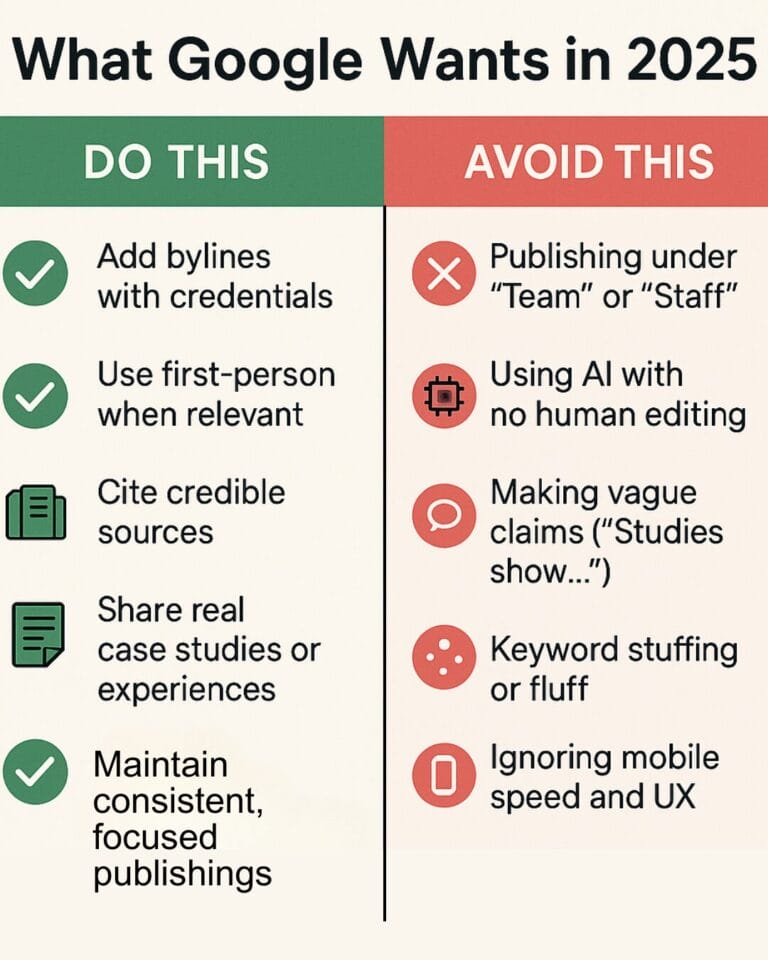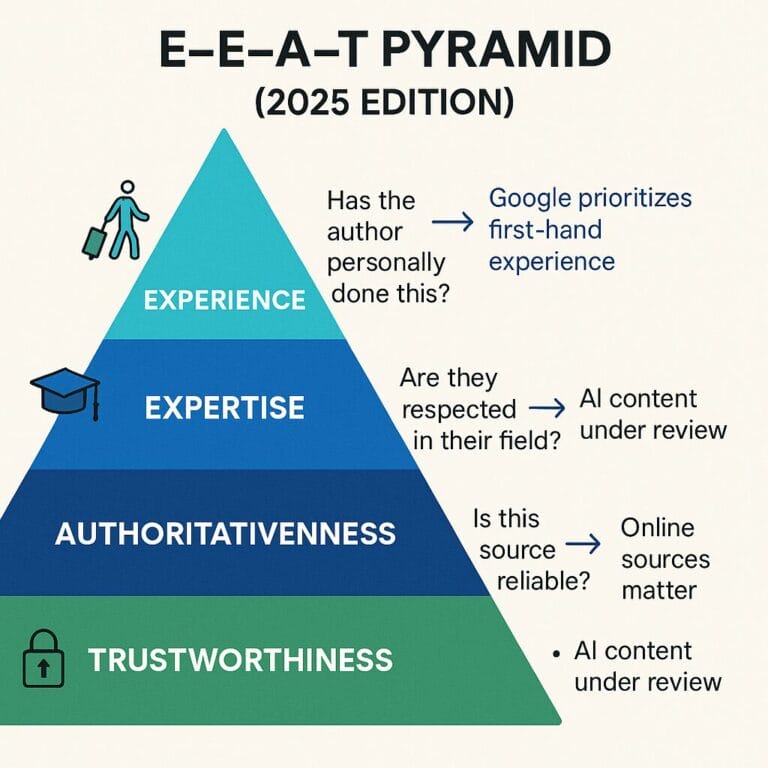If you’ve been anywhere near the digital marketing world lately, you’ve heard the acronym E-E-A-T tossed around constantly. For SEO managers at SaaS startups and in-house teams throughout healthcare, ecommerce, and other YMYL (Your Money or Your Life) industries, it now plays a central role in shaping search engine optimization. E-E-A-T, Experience, Expertise, Authoritativeness, and Trustworthiness, has grown into a universal ranking factor across all web pages, and 2025’s changes make it even more important..
Google Search uses this framework to determine whether your content creation meets expectations for valuable content, real experience, and strong trust signals. If your SEO strategy hasn’t kept up with new algorithm updates, chances are your search rankings or organic traffic may already show it.
A Look Back: How Did E-E-A-T Evolve from a Quality Signal to a Core Ranking Factor?
E-E-A-T moved from a light guideline to a defining measure of high-quality content as Google refined its algorithms to judge credibility and real-world usefulness more accurately.
When Google first introduced E-A-T, it functioned as a quiet signal helping search engines understand authoritativeness and trustworthiness. The 2018 Medic Update reshaped YMYL topics, especially healthcare and finance, where citations, author bios, and transparent contact information became essential for building trust.
Google expanded E-A-T in late 2022 by adding Experience, ensuring that firsthand experience, real-world examples, and practical insights carried more weight than generic summaries. Readers want subject matter depth; algorithms do too. Someone who has spent time in a place, tested a tool, or worked through a problem can bring real-life clarity that purely AI-generated content lacks.
Across updates, from Helpful Content to product reviews, Google reinforced a consistent expectation: publish high-quality writing supported by proofs of real experience and trust signals backed by reputable sources.
What’s New in 2025: How Do Google’s Updated E-E-A-T Guidelines Redefine Quality Content?
Google’s Search Quality Rater Guidelines place heavier emphasis on firsthand expertise, transparent authorship, and content that directly satisfies user intent.
A recent BrightEdge study found that 58% of pages losing traffic in 2024 lacked strong E-E-A-T elements, especially clear authorship and authoritativeness (2024). That trend has only accelerated in 2025.
Is Firsthand Experience Now a Required Element of High-Quality Content?
Yes. Content with firsthand insight ranks higher because it demonstrates subject matter depth.
Google now expects writers to bring firsthand experience into reviews, comparisons, and case studies. It doesn’t require journals or personal stories, it simply rewards content where the content creator demonstrates they actually engaged with the subject. That could be testing a workflow, evaluating a platform, or pulling lessons from client work.
To keep your content marketing effective, pair analysis with real examples. This gives your pages credibility and helps show relevance across social media, forums, and LinkedIn conversations.
For support developing strong content strategy, explore V9 Digital’s Marketing Services
Does Google Require Credible Authorship and Transparent Sourcing?
Yes. Transparent authors and cited reputable websites strengthen both user trust and rankings.
Google rewards content that shows:
- Clear author bios including experience, certifications, or relevant background
- A link to an About page
- Supportive citations from authoritative sources
- Traceable references to reputable sources
Even without formal credentials, openness builds trust. Present your process, share practical insights, and back claims with reliable studies or industry experts. This is central to building trust and demonstrating trustworthiness.
“Google is not looking for perfection; it’s looking for authenticity and transparency. As E-E-A-T evolves, showing genuine experience and supporting every claim with clear, credible evidence is key to earning both trust and rankings.”
— Marie Haynes, SEO industry thought leader
Does Precise Search Intent Matching Matter More in 2025?
Absolutely. Google’s improved understanding of user behavior means pages must respond directly to the searcher’s needs.
Modern algorithms examine depth, accuracy, wording, and clarity. They also use metrics like time on page and bounce rate as indirect indicators of satisfaction. Effective optimization now depends on understanding the audience’s journey. Beginners need clarity; professionals want in-depth nuance.
How Does Google Treat Ai-Generated Content Now?
AI is fine, but generic AI copy isn’t. Human guidance must shape every piece.
Google isn’t anti-AI, but it’s firm about requiring editorial oversight. Pages created solely by AI often lack the nuance, emotion, or real-life detail that signals experience. Strong SEO blends AI efficiency with human judgment, emotional context, and practical examples.
How Does the E-E-A-T Framework Directly Impact Your SEO Strategy in 2025?
E-E-A-T shapes content, credibility, link building, and the technical foundation that supports visibility.

How Can Content Creation Prove Real-World Expertise?
Demonstrate real experience through examples, evidence, and supportive signals.
Search engines prioritize content with practical insights. Use testimonials, case studies, or specific steps your team followed. Support them with:
- Citations from authoritative sources
- References to reputable websites
- Schema markup and structured data
This helps both users and search engines confirm your expertise.
What Technical SEO Elements Support E-E-A-T?
Your technical foundation allows credibility signals to work.
Strong technical SEO includes:
- HTTPS
- Clear contact information
- Fast load times
- Mobile responsiveness
- Clean navigation
- Structured data
- Transparent policies
These elements support user experience and reinforce trust.
How Do AI and Human Editors Work Together Effectively?
AI helps with speed; humans ensure accuracy, nuance, and compliance with E-E-A-T standards.
AI can organize drafts or research topics, but human editors refine claims, verify details, and confirm alignment with YMYL expectations. This hybrid approach supports high-quality content without losing authenticity.

Practical Ways to Strengthen E-E-A-T and Improve SEO Performance in 2025
Strengthen trust, show expertise, and stay consistent.
1. Add clear bylines and detailed author bios
Highlight background, certifications, and relevant experience. Include structured data.
2. Write from real experience using first-person insights
Simple details show authenticity and help differentiate your work from AI-generated content.
3. Cite reputable sources to strengthen authority
Especially important for YMYL topics.
4. Encourage reviews and user-generated content
User reviews, feedback, and testimonials strengthen trust.
5. Build external authority through real visibility
Guest posts, webinars, and podcast appearances help secure valuable backlinks.
6. Stay consistent with your content strategy
Regular, topic-focused new content builds topical depth.
Common SEO Pitfalls: What Mistakes Damage E-E-A-T Credibility?
Anonymous writing, generic content, and missing trust elements weaken visibility. Common issues include:
- Anonymous or faceless articles
- Overreliance on AI without human editing
- Ignoring critical technical SEO issues
- Missing contact information
- Failing to use citations, reviews, or trust elements
These oversights weaken both ranking potential and reader trust.
Why Is E-E-A-T the Foundation of a Sustainable SEO Strategy?
Because E-E-A-T lines up user trust with algorithmic expectations.
E-E-A-T isn’t a passing trend, it shapes every part of search engine optimization. When you align with google E-E-A-T expectations, you create content that supports readers’ goals, protects their well-being, and helps them make informed decisions. Update older content, reinforce trust signals, and ensure that every new page reflects clear expertise.
If your team needs support refining these elements, V9 Digital can help strengthen your presence through thoughtful strategy, real experience, and trusted voices.
Common Questions
1. How does E-E-A-T help my SEO?
E-E-A-T helps Google evaluate the credibility and usefulness of your pages. Sites with strong experience, transparent authors, and reputable sources tend to perform better in SERPs.
2. What makes firsthand experience valuable?
It shows that the writer understands the subject from real-world interactions. This helps Google and users trust the content more than generic summaries.
3. Are backlinks still important?
Yes, but quality matters more than volume. Backlinks from relevant, reputable sources carry far more weight than large batches of low-value links.
4. Does AI-generated content hurt rankings?
AI content doesn’t harm rankings if a human editor reviews it, verifies accuracy, and adds real insights. Fully automated content usually lacks the depth Google expects.
5. How do reviews and user-generated content help?
They provide independent proof of trust and experience. Google values transparent feedback because it shows authenticity.
6. What technical SEO elements support E-E-A-T?
Security, clear navigation, structured data, fast load times, and accurate indexing all help Google understand and trust your pages.
7. Should ecommerce sites focus on E-E-A-T?
Absolutely. Ecommerce touches user finances and purchase confidence, so strong trust signals are essential for both rankings and conversion.
8. How can influencers or experts improve E-E-A-T?
Credible influencers, podcasts, or thought leaders can strengthen authoritativeness through mentions, reviews, and quality backlinks.
